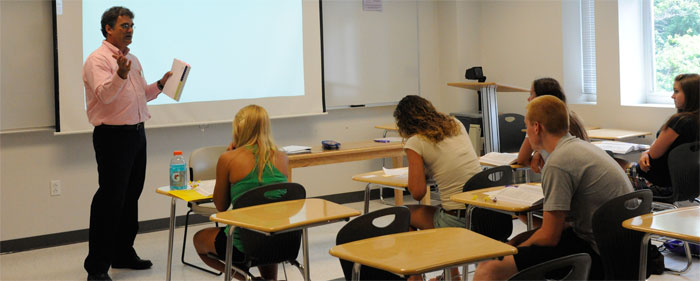Freshman Advisers Interested in More Than Class Schedules
News
By Paula Polglase, JMU Public Affairs
"What concerns you most during your first year at James Madison University? Is it time management? Living in the residence hall? Doing well academically? Fitting in? Procrastination? The amount of freedom?"
JMU's freshman advisers want to know.
JMU has developed a unique freshman advising program based on the developmental theory of advising. JMU advisers are concerned about more than just scheduling classes, they advise the whole person. In fact, the questions about concerns facing new students are but a few of the far-reaching queries posed by JMU advisers.
Psychology Associate Professor Kenneth Barron starts his summer advising sessions by asking students why they came to college. Michael Moghtader, associate professor of writing, rhetoric and technical communication, wants to know who influenced the student's expectations about what the college experience should be like.
The National Academic Advising Association has recognized Barron and Moghtader as outstanding advising award winners.
A Unique Approach
According to Lee Ward, director of Career and Academic Planning, developmental advising in itself is not unique, but because of the time it takes it is not usually applied to a university with 18,000 students.
Another unique factor—JMU employs both professional and faculty advisers.
Fourteen CAP staff members advise the 25 percent of freshmen who have not declared an academic major. Because of their dual role as academic and career counselors they are able to offer students guidance in exploring majors that relate to their career interests.
Faculty advisers are assigned to the 75 percent of freshmen who come in with a declared major. Ward's department recruits and trains freshman advisers to be experts in both academic and student-life matters.
"We get so many unique partners on the campus together, I think that one of the other things that makes freshman advising thrive is it really requires us to be interdisciplinary and cross-campus connected," said Barron.
Role of the Adviser
Freshman advisers help students transition to college by providing advice on academic planning and information on JMU resources. In order to guide a student's academic choices with regard to long-term academic and career goals they have to first get to know the student.
Incoming freshmen meet with their advisers in a small group and one-on-one during summer orientation. They continue the relationship established in the summer through e-mail, Blackboard and face-to-face conversations. Freshman advisers serve their advisees through February of their freshman year when they are assigned an adviser in their major.
Commenting about the initial summer meeting Moghtader said, "I never let a student leave without them knowing that I have a sense of who they are."
Rosemary Grant, a junior who is majoring in English and media arts and design, said, "Looking back, I think Dr. M dealt with my over-exuberance to change majors in a way that eventually led me to making the right decision for me. In my head, double majoring in English and health sciences sounded like a great idea. When I demanded quick answers, he remained patient and insisted that we look into the details of my new major choices."

"By advising first, I can provide students the essential context to appreciate what college can be and how they can take full advantage of getting the most out of it while they are here."—Dr. Kevin Barron
Philosophy of Advising
Barron, who has been a freshman adviser for 10 years, keeps a bumper sticker on his door that he says sums up his philosophy on advising. It reads, "Advising is Teaching." He knows that students are anxious to schedule their classes but insists that getting to know the student first is time well spent for both adviser and advisee.
Barron says, "By advising first, I can provide students the essential context to appreciate what college can be and how they can take full advantage of getting the most out of it while they are here."
Moghtader, in his fifth year of freshman advising, sees himself as a transition worker, someone to guide the student through the many resources JMU has to offer. "A good adviser is less a source of knowledge as much as a good researcher of information that will help students navigate the complexities of university rules and regulations."
Both advisers say the ultimate goal is help their advisees succeed in their first year and grow into adults who will develop skills to find their own answers.

